|
|
|
Sort Order |
|
|
|
Items / Page
|
|
|
|
|
|
|
| Srl | Item |
| 1 |
ID:
152502
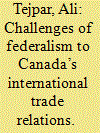

|
|
|
|
|
| Summary/Abstract |
As one of the first “second-generation” free trade agreements that address indirect and non-tariff barriers, the Canada–European Union Comprehensive Economic and Trade Agreement (CETA) is likely to serve as an international model. CETA, however, highlights significant challenges for Canadian federalism in both the negotiation and implementation processes of this and any such future trade agreements. While the inclusion of sub-federal governments allows for provinces/territories to help shape the provisions that fall within their jurisdictions, this paper argues that subsequent challenges arise in conveying a unified Canadian commitment to implement the agreement. Overall, the CETA negotiations demonstrated the significant institutional weaknesses of current federal–provincial/territorial relations with respect to international trade agreements. In the Canadian context, this suggests a need for “summit federalism” to ensure that all federal–provincial/territorial governments align their terms and interests and convey a unified commitment to fulfilling Canada’s current and future international trade agreements.
|
|
|
|
|
|
|
|
|
|
|
|
|
|
|
|
| 2 |
ID:
152500
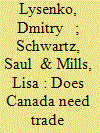

|
|
|
|
|
| Summary/Abstract |
Trade adjustment assistance (TAA) is government aid to those affected by trade agreements. We review the history of TAA in Canada and ask whether Canada needs to reintroduce it in response to the recent intensification of trade negotiations. In light of the compensation offered by the federal government in connection with the Canada–European Union Comprehensive Economic and Trade Agreement (CETA), we examine how TAA fits in with the evolution of Canadian federalism in the trade policy area. Based in part on interviews with provincial trade negotiators, we conclude, first, that the compensation is an outcome of Canadian federalism. Second, we argue that while there is no reason to reintroduce a federal TAA program for workers, compensation for provinces is necessary to facilitate their cooperation with the implementation of trade treaty provisions. Third, we suggest that a more transparent rationale for such compensation would be superior to the ad hoc compensation observed in CETA.
|
|
|
|
|
|
|
|
|
|
|
|
|
|
|
|
| 3 |
ID:
152498


|
|
|
|
|
| Summary/Abstract |
Comparative analyses have found that non-self-governing islands tend to have much better development indicators than sovereign islands. Perhaps unsurprisingly, since 1983 no non-self-governing island has acquired political independence. This paper argues that rather than merely maintaining the status quo with their colonial metropoles, non-self-governing islands are actively creating a new form of sovereignty. This creation of an “Islandian” sovereignty takes place against the backdrop of debates on the relevance of classic Westphalian sovereignty and emerging practices of Indigenous sovereignty. This paper reviews global research on the sovereignty of islands and from this review, develops an analytical framework of five mechanisms that drive the emerging Islandian sovereignty. This framework is tested and illustrated with a case study of the negotiations about sovereignty between New Caledonia and its colonial metropole, France.
|
|
|
|
|
|
|
|
|
|
|
|
|
|
|
|
| 4 |
ID:
152495
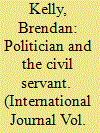

|
|
|
|
|
| Summary/Abstract |
This article uses the experience of Marcel Cadieux, the Canadian under-secretary of state for external affairs at the time, as a lens through which to understand the adaptation of the Department of External Affairs to the government of Pierre Trudeau during its first year-and-a-half in power. Drawing on Cadieux’s private papers, especially his diary, and other archival sources, it explores the prime minister’s attitude toward senior civil servants, his personality, and the review of national defence policy undertaken by the bureaucracy at his request. It concludes that the difference between Pierre Trudeau and Marcel Cadieux was essentially that between the brilliant politician who sought to redefine government and the consummately professional civil servant who believed in his department’s traditional role.
|
|
|
|
|
|
|
|
|
|
|
|
|
|
|
|
| 5 |
ID:
151379
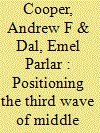

|
|
|
|
|
| Publication |
International Journal Vol: 71 No 4.
|
| Summary/Abstract |
This article argues that middle power diplomacy can be identified as having gone through three distinct waves. The first is connected with the immediate post-1945 global order, with a focus on multilateralism via the United Nations and related bodies. The second moved to ad hoc bursts of activism related to specific issue area niches. The third and current wave, by contrast, is embedded in the informal institutionalization associated with the G20. Just as the BRICS have used the G20 as a catalyst for differentiated activities both around and independent of the G20, the “missing middle” in the G20 (countries increasingly portrayed as middle powers beyond both the BRICS and the G7) have begun to explore the possibility of collective action. MIKTA (Mexico, Indonesia, Turkey, South Korea, and Australia), while possibly a significant advance in global governance, has the potential of hardening the categories of countries identified as middle powers. At the same time, the MIKTA countries face a number of serious constraints in terms of this global reach. Institutional elevation is compromised by practice limitations, most notably the hold of regional imperatives.
Keywords
|
|
|
|
|
|
|
|
|
|
|
|
|
|
|
|
| 6 |
ID:
152499
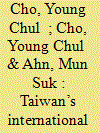

|
|
|
|
|
| Summary/Abstract |
This paper provides a critical check to the ongoing, dominant blue/green debate about Taiwan’s identity vis-à-vis China. The colour blue is associated with those who support closer ties with China and green with those who support Taiwanese independence. The state-centric debate over unification, independence, or the status quo in cross-strait relations is closely tied to Taiwan’s national aspirations to enhance its international standing in the twenty-first century, a standing which is arguably diplomatically under-recognized. Based on a critical discussion of the blue/green debate, this paper presents two pragmatic ways of augmenting Taiwan’s international visibility through global recognition without jeopardizing national security or regional stability in East Asia.
|
|
|
|
|
|
|
|
|
|
|
|
|
|
|
|
| 7 |
ID:
152503
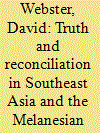

|
|
|
|
|
| Summary/Abstract |
Recent experiences with truth and reconciliation processes in Southeast Asia and the Southwest Pacific suggest that there is a role for historical research and memory in helping to build sustainable peace and stability in new nations—and conversely, that ignoring violent pasts undermines peacebuilding efforts. Two truth commissions have operated in this region, in Timor-Leste (East Timor) and Solomon Islands. There are also calls for truth and reconciliation processes in Indonesia at the national and local levels, including in (West) Papua. As the only Western developed country to have held a full truth commission, Canada could play a powerful role in promoting and supporting mutual dialogue on the implementation of truth and reconciliation outside its borders. We can derive both potential lessons and recommendations for Canadian action to promote truth and reconciliation processes from the cases of Indonesia, Solomon Islands, and Timor-Leste.
|
|
|
|
|
|
|
|
|
|
|
|
|
|
|
|
| 8 |
ID:
152496
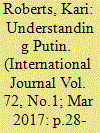

|
|
|
|
|
| Summary/Abstract |
Russia’s 2014 annexation of Crimea and the subsequent deterioration in its relations with the West have led many analysts to adopt a narrow view of Vladimir Putin’s foreign policy motivations, chalking them up to old-school geopolitics. This paper makes the case that the traditional structural explanations for Russian foreign policy that are dominant within the discipline of international relations do not adequately consider the influence of identity in Putin’s emerging foreign policy narrative. Putin’s narrative is shaped by, and shapes, a discourse about cultural and historical ties with Russian borderlands, as well as by the cultural and security vulnerabilities generated by the West’s treatment of Russia, evidenced by the expansion of the North Atlantic Treaty Organization (NATO). This discourse has underscored a more militant foreign policy turn under Putin in which he is prepared to protect and defend Russia’s interests at high cost; Russia’s actions in Crimea exemplify this. This connection between identity and foreign policy in Putin’s Russia demands attention if we hope to gain a better grasp of Russian foreign policy under his leadership.
|
|
|
|
|
|
|
|
|
|
|
|
|
|
|
|
| 9 |
ID:
152504
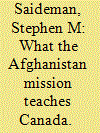

|
|
|
|
|
| Summary/Abstract |
This paper considers some of the lessons that can be drawn from Canada’s experience in Afghanistan. It focuses not just on the military but also on the rest of the government, two prime ministers, the opposition, the media, and the public. While the primary lesson might be “do not do this kind of thing again,” there are other lessons to draw that apply to Canada’s foreign and defence policies every day.
|
|
|
|
|
|
|
|
|
|
|
|
|
|
|
|
|
|
|
|
|